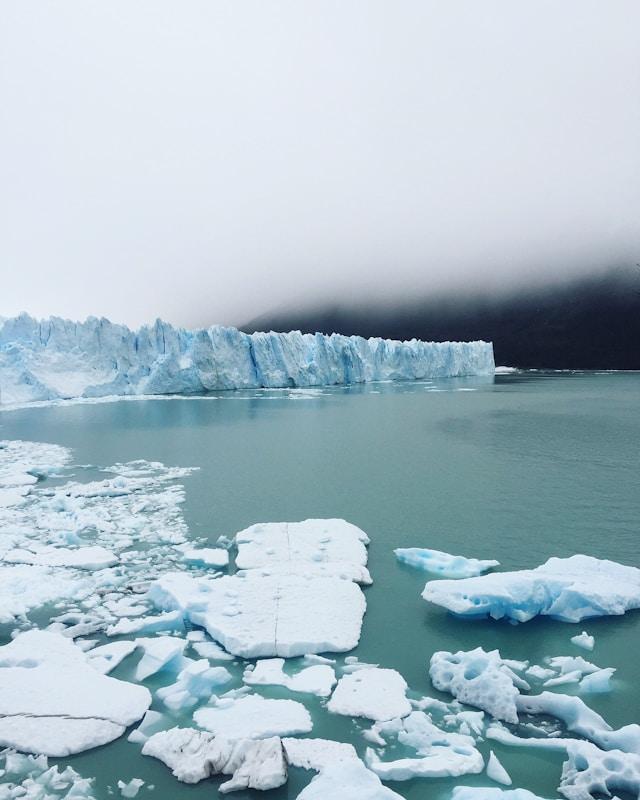Water States
Earth is the only place in the Solar System where water can be present in its three states: solid, liquid, and vapor.
Water is the only substance on Earth that is present in all three states of matter – as a solid, liquid, or gas. (And Earth is the only planet where water is present in all three states.) Because of the ranges in temperature in specific locations around the planet, all three phases may be present in a single location or in a region. The three phases are solid (ice or snow), liquid (water), and gas (water vapor). Because Earth’s water is present in all three states, it can get into a variety of environments around the planet. The movement of water around the Earth’s surface is the hydrologic (water) cycle.
Because it is a cycle, the water cycle has no beginning and no end.
The Sun, many millions of kilometers away, provides the energy that drives the water cycle. Our nearest star directly impacts the water cycle by supplying the energy needed for evaporation.
Most of Earth’s water is stored in the oceans where it can remain for hundreds or thousands of years. The oceans are discussed in detail in the chapter Earth’s Oceans.
Water changes from a liquid to a gas by evaporation to become water vapor. The Sun’s energy can evaporate water from the ocean surface or from lakes, streams, or puddles on land. Only the water molecules evaporate; the salts remain in the ocean or a freshwater reservoir.
Source: Ultimate Facts
@https://unsplash.com/photos/iceberg-on-body-of-water-under-cloudy-sky-qyVmp3mcFc0
Earth is the only place in the Solar System where water can be present in its three states: solid, liquid, and vapor.
Water is the only substance on Earth that is present in all three states of matter – as a solid, liquid, or gas. (And Earth is the only planet where water is present in all three states.) Because of the ranges in temperature in specific locations around the planet, all three phases may be present in a single location or in a region. The three phases are solid (ice or snow), liquid (water), and gas (water vapor). Because Earth’s water is present in all three states, it can get into a variety of environments around the planet. The movement of water around the Earth’s surface is the hydrologic (water) cycle.
Because it is a cycle, the water cycle has no beginning and no end.
The Sun, many millions of kilometers away, provides the energy that drives the water cycle. Our nearest star directly impacts the water cycle by supplying the energy needed for evaporation.
Most of Earth’s water is stored in the oceans where it can remain for hundreds or thousands of years. The oceans are discussed in detail in the chapter Earth’s Oceans.
Water changes from a liquid to a gas by evaporation to become water vapor. The Sun’s energy can evaporate water from the ocean surface or from lakes, streams, or puddles on land. Only the water molecules evaporate; the salts remain in the ocean or a freshwater reservoir.
Source: Ultimate Facts
@https://unsplash.com/photos/iceberg-on-body-of-water-under-cloudy-sky-qyVmp3mcFc0
Water States
Earth is the only place in the Solar System where water can be present in its three states: solid, liquid, and vapor.
Water is the only substance on Earth that is present in all three states of matter – as a solid, liquid, or gas. (And Earth is the only planet where water is present in all three states.) Because of the ranges in temperature in specific locations around the planet, all three phases may be present in a single location or in a region. The three phases are solid (ice or snow), liquid (water), and gas (water vapor). Because Earth’s water is present in all three states, it can get into a variety of environments around the planet. The movement of water around the Earth’s surface is the hydrologic (water) cycle.
Because it is a cycle, the water cycle has no beginning and no end.
The Sun, many millions of kilometers away, provides the energy that drives the water cycle. Our nearest star directly impacts the water cycle by supplying the energy needed for evaporation.
Most of Earth’s water is stored in the oceans where it can remain for hundreds or thousands of years. The oceans are discussed in detail in the chapter Earth’s Oceans.
Water changes from a liquid to a gas by evaporation to become water vapor. The Sun’s energy can evaporate water from the ocean surface or from lakes, streams, or puddles on land. Only the water molecules evaporate; the salts remain in the ocean or a freshwater reservoir.
Source: Ultimate Facts
🖼️@https://unsplash.com/photos/iceberg-on-body-of-water-under-cloudy-sky-qyVmp3mcFc0






